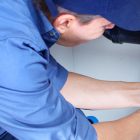A dishwasher is a valuable appliance in any modern kitchen, making the chore of cleaning dishes significantly easier and more efficient. However, like any other appliance, dishwashers are prone to wear and tear and may require repairs from time to time. Understanding the signs that indicate your dishwasher needs repair can help you address issues before they escalate into bigger, more costly problems.
Contents
Common Signs Your Dishwasher Needs Repair
Dishes Come Out Dirty
One of the most obvious signs that your dishwasher needs repair is if your dishes are consistently coming out dirty. A dishwasher’s primary function is to clean your dishes thoroughly. If you notice food particles, grease, or residue on your dishes after a full cycle, it may be time to investigate the cause.
- Possible Causes: The problem might be due to a clogged spray arm, a malfunctioning pump, or a worn-out filter. In some cases, it could also be due to using the wrong detergent or overloading the machine.
- Solution: Check for blockages in the spray arms and clean them if necessary. Ensure you’re using the correct detergent and loading the dishwasher according to the manufacturer’s instructions. If the issue persists, it might be time to call a professional to determine if more complex components like the pump need repair.
Unusual Noises During Operation
Dishwashers typically produce some noise during operation, but excessive or unusual noises are a sign that something might be wrong. Grinding, thumping, or rattling noises can indicate a need for repair.
- Possible Causes: These noises can be caused by a foreign object caught in the dishwasher’s motor or pump, worn-out bearings, or issues with the spray arm.
- Solution: Inspect the dishwasher for any loose items or foreign objects that may be causing the noise. If the sound continues, it could be a mechanical issue requiring professional repair. Ignoring these sounds could lead to more serious damage over time.
Water Leaks Around the Dishwasher
Finding water puddles around your dishwasher needs repair is a clear sign of a problem. Not only can leaks lead to higher water bills, but they can also cause damage to your kitchen flooring and cabinets.
- Possible Causes: Water leaks can be due to a faulty door seal, a broken water inlet valve, or a damaged hose. It could also be a result of overloading the dishwasher or using too much detergent.
- Solution: Check the door seals for any signs of wear and tear and replace them if necessary. Inspect hoses for cracks or damage and ensure all connections are tight. If leaks continue, it may be necessary to call a professional technician to assess and repair the problem.
Why Prompt Repair is Important
Prevent Further Damage
Ignoring the signs that your dishwasher needs repair can lead to more extensive and costly damages. For instance, a minor leak can eventually cause water damage to your kitchen flooring or even compromise the structural integrity of your cabinetry. Promptly addressing repair needs helps prevent such escalation.
- Maintenance Tip: Regularly inspect your dishwasher needs repair for any signs of wear and tear and address them immediately to avoid more significant issues down the line.
Save Money in the Long Run
While it might seem like an inconvenience to repair your dishwasher needs repair, especially if it’s still functioning, it’s often more cost-effective in the long run. Addressing minor issues before they become significant problems can save you money on more extensive repairs or the need for a replacement appliance.
- Financial Insight: Repairing a small component is typically less expensive than replacing an entire dishwasher. Regular maintenance and prompt repairs can extend the life of your appliance, offering better returns on your initial investment.
Energy Efficiency
A malfunctioning dishwasher can lead to increased water and energy usage. For example, if your dishwasher doesn’t drain properly, it might run additional cycles to compensate, consuming more water and electricity.
- Environmental Impact: By repairing your dishwasher promptly, you contribute to more efficient energy and water use, which is better for the environment and your utility bills.
How to Find a Reliable Repair Service
Check for Certification and Experience
When looking for a professional to repair your dishwasher, it’s important to ensure they have the necessary certification and experience. A certified technician will have the expertise to diagnose and repair issues correctly.
- Research Tip: Look for reviews and testimonials from previous customers to gauge the reliability and quality of service. A reputable service provider should have a track record of satisfied customers.
Ask About Warranty and Guarantees
A reliable repair service should offer warranties or guarantees on their work. This ensures that if the same issue arises again, you can have it addressed without additional cost.
- Consumer Advice: Always ask about the warranty terms and conditions before agreeing to a repair service. This information should be clear and transparent to avoid any future misunderstandings.
Get a Detailed Estimate
Before proceeding with any repairs, ask for a detailed estimate of the costs involved. This should include labor, parts, and any additional fees. A trustworthy repair service will provide a transparent estimate without hidden charges.
- Financial Planning: Understanding the costs upfront allows you to budget accordingly and avoid unexpected expenses.
DIY Tips for Minor Dishwasher Issues
Cleaning the Spray Arms
If your dishes aren’t coming out clean, it might be due to clogged spray arms. You can easily remove and clean them using a toothpick or a small brush to clear any debris.
- Maintenance Tip: Regularly cleaning the spray arms can prevent blockages and ensure your dishwasher functions efficiently.
Inspect and Clean Filters
Filters can become clogged with food particles and debris, leading to poor cleaning performance. Regularly inspect and clean the filters to maintain your dishwasher’s efficiency.
- DIY Step: Remove the filter from the dishwasher needs repair , rinse it under warm water, and scrub it with a soft brush to remove any buildup.
Use the Right Detergent
Using the correct detergent is crucial for the effective operation of your dishwasher. Ensure you’re using a detergent specifically designed for dishwashers to prevent siding and ensure optimal cleaning.
- Product Tip: Avoid using dish soap meant for hand washing, as it can create excessive suds and lead to leaks.
When to Call a Professional
Persistent Issues After DIY Attempts
If you’ve tried basic troubleshooting steps and your dishwasher still doesn’t work properly, it’s time to call a professional. They have the expertise to diagnose and fix complex issues that you may not be able to address on your own.
- Expert Insight: Professionals can provide insights into the health of your appliance and offer maintenance tips to prevent future issues.
Electrical or Mechanical Failures
If your dishwasher isn’t turning on, has electrical issues, or shows signs of mechanical failure, these are complex problems best left to professionals. Attempting repairs without the necessary knowledge can lead to further damage or even personal injury.
- Safety Advice: Always prioritize safety and rely on certified technicians to handle electrical or mechanical issues.
Strange Smells or Excessive Heat
If you notice unusual smells or excessive heat coming from your dishwasher, it’s crucial to address these issues immediately. These can indicate electrical problems or overheating components.
- Immediate Action: Unplug the dishwasher and contact a professional repair service to inspect and repair any potential hazards.
Contact a Professional Today
If you notice any of these signs indicating that your dishwasher needs repair, don’t hesitate to contact a professional. Prompt repairs can save you time, money, and the hassle of dealing with more significant issues down the line.
For expert dishwasher needs repair services, call us at 0508700774. Our team of certified technicians is ready to help you get your dishwasher back in optimal working condition.



